Solid
A solid is one of the three main states of matter, along with liquid and gas. Solids have a definite shape and volume, and their particles are closely packed together in a regular pattern.
Characteristics of Solids
- Definite Shape: Unlike liquids and gases, solids have a fixed shape and do not conform to the shape of their container.
- Definite Volume: Solids also have a fixed volume and maintain their shape regardless of the container they are in.
- Particle Arrangement: The particles in a solid are tightly packed in a regular, repeating pattern, which gives solids their rigidity.
- Incompressibility: Solids are generally not easily compressed due to the close arrangement of their particles.
- High Density: Solids are typically denser than liquids and gases due to the close packing of particles.
Examples of Solids
Common examples of solids include:
Properties of Solids
Some properties of solids include:
- Hardness: Solids can vary in hardness, from soft materials like rubber to hard materials like diamond.
- Melting Point: Each solid has a specific temperature at which it changes from a solid to a liquid, known as its melting point.
- Conductivity: Some solids conduct heat and electricity, while others are insulators.
Conclusion
In conclusion, solids are a fundamental state of matter with distinct characteristics, properties, and examples. Understanding the nature of solids is essential for comprehending the physical world around us.
[Solid] Related Worksheets and Study Guides:
.◂Science Worksheets and Study Guides Second Grade. Comparing matter
Study Guide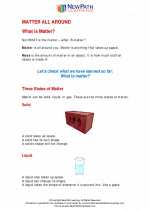 Comparing matter
Comparing matter  Activity Lesson
Activity Lesson Matter All Around
Matter All Around  Worksheet/Answer key
Worksheet/Answer key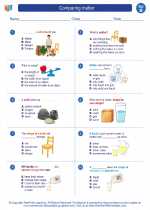 Comparing matter
Comparing matter  Worksheet/Answer key
Worksheet/Answer key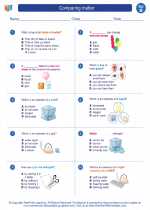 Comparing matter
Comparing matter  Worksheet/Answer key
Worksheet/Answer key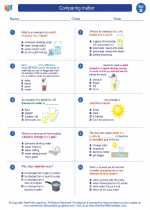 Comparing matter
Comparing matter  Vocabulary/Answer key
Vocabulary/Answer key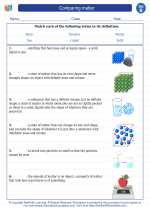 Comparing matter
Comparing matter 

 Activity Lesson
Activity Lesson
 Worksheet/Answer key
Worksheet/Answer key
 Worksheet/Answer key
Worksheet/Answer key
 Worksheet/Answer key
Worksheet/Answer key
 Vocabulary/Answer key
Vocabulary/Answer key

The resources above cover the following skills:
PHYSICAL SCIENCE (NGSS)
Matter and its Interactions
Students who demonstrate understanding can:
Construct an argument with evidence that some changes caused by heating or cooling can be reversed and some cannot.